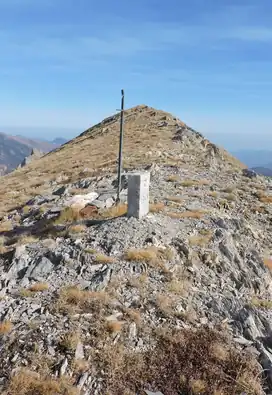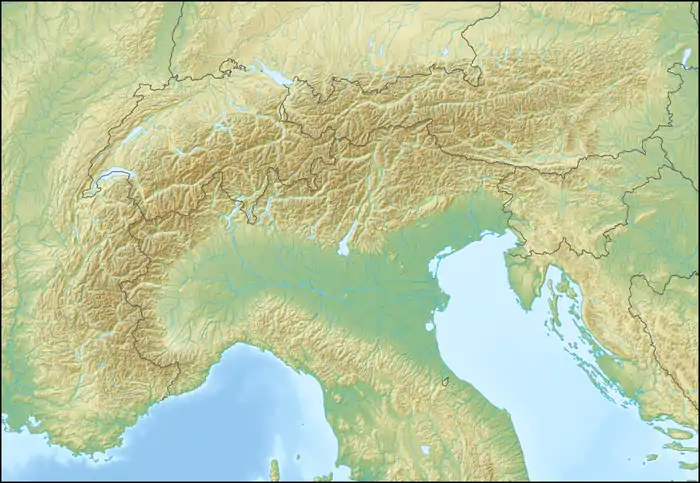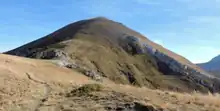| Cima di Pertegà | |
|---|---|
| Cime de la Pertègue | |
 | |
| Highest point | |
| Elevation | 2,404 m (7,887 ft)[1] |
| Prominence | 297 m (974 ft)[1]>[2] |
| Coordinates | 44°08′50.39″N 7°40′45.19″E / 44.1473306°N 7.6792194°E |
| Geography | |
 Cima di Pertegà Location in the Alps | |
| Location | Piemonte, Italy - Provence-Alpes-Côte d'Azur, France |
| Parent range | Ligurian Alps |
| Climbing | |
| First ascent | ancestral |
| Easiest route | step meadows |
Cima di Pertegà (Italian) or Cime de la Pertègue (French) is a mountain located on the French-Italian border between Piemonte and Provence-Alpes-Côte d'Azur.
History
Until World War II, the mountain belonged wholly to Italy. Since the Paris Peace Treaties, signed in February 1947, however, it is shared by Italy and France.[3] In former times it was known as Cima Varcona or Cima Valcona.[4]
Geography


The mountain belongs to the Ligurian Alps and is located on the main chain of the Alps. On its top three ridges meet: on the northern one a saddle at 2.207 m,[5] sometimes named Colle di Capoves,[6] divides the Cima di Pertegà from the Cime de Capoves (2.260 m[5]). Going east a mountain ridge starts from Cima di Pertegà dividing Carnino valley (a north) from the central part of the Tanarello valley, while going South the Cima di Pertegà is divided by the nearby Cime de l'Eveque and Monte Bertrand by the steep saddle of the colle delle Selle Vecchie. On the Italian side of the mountain runs a former-military dirt road connecting Monesi (a village of the municipality of Triora) with the colle di Tenda. The summit of the Cima di Pertegà is marked by a boundary marker, and close to it is located a small summit cross.
SOIUSA classification
According to the SOIUSA (International Standardized Mountain Subdivision of the Alps) the mountain can be classified in the following way:[7]
- main part = Western Alps
- major sector = South Western Alps
- section = Ligurian Alps
- subsection = (It:Alpi del Marguareis/Fr:Alpes Liguriennes Occidentales)
- supergroup = (It:Catena Marguareis-Mongioie/Fr:Chaîne Marguareis-Mongioie)
- group = (It:Gruppo del Marguareis/Fr:Groupe du Marguareis)
- subgroup = (It:Nodo del Marguareis/Fr:Nœud du Marguareis)
- code = I/A-1.II-B.2.a
Environment
The mountain is made of steep but regular and grassy slopes. Its NE slopes are included in the Parco naturale del Marguareis.[8]
Hiking
The mountain is accessible by walking tracks on steep meadows starting from the Colle dei Signori (North of the summit), Colle delle Selle Vecchie (South) or Passo di Framargal (East).[9] The summit is also a well known winter hike, mainly for ski mountaineers.[10]
Mountain huts
- Rifugio Don Barbera
Maps
- Cartografia ufficiale italiana in scala 1:25.000 e 1:100.000 (Map). Istituto Geografico Militare.
- Géoportail (French official maps) (Map). Institut géographique national.
- Carta in scala 1:50.000 n. 8 Alpi Marittime e Liguri (Map). Torino: Istituto Geografico Centrale.
See also
References
- 1 2 carta in scala 1:25.000 n.16 "Parco del Marguareis" (Map). Fraternali.
- ↑ Key col: Colle dei Signori (2107 m)
- ↑ Trattato di pace tra Italia ed Alleati, treaty text on www.instoria.it. Accessed 6 February 2016.
- ↑ Alpi Marittime. CAI - Sezione di Torino. 1908. p. 414. Retrieved 18 November 2017.
- 1 2 Institut national de l'information géographique et forestière, official 1:25.000 map on www.geoportail.gouv.fr
- ↑ CompagniadellAnello (29 May 2017). "Anello della Cresta del Ferà da Carnino Superiore". Retrieved 6 November 2017.
- ↑ Marazzi, Sergio (2005). Atlante Orografico delle Alpi. SOIUSA (in Italian). Priuli & Verlucca. ISBN 978-88-8068-273-8.
- ↑ On-line map published by the park, see www.parcomarguareis.it Archived 2017-12-01 at the Wayback Machine
- ↑ users frankie56 e Andrea81 (17 June 2009). "Pertegà (Cima di) da Upega, anello per la Cresta del Ferà e Colle Selle Vecchie".
{{cite web}}: CS1 maint: numeric names: authors list (link) - ↑ "Pertegà (Cima di) da Upega". Retrieved 20 November 2017.
![]() Media related to Cima di Pertegà at Wikimedia Commons
Media related to Cima di Pertegà at Wikimedia Commons